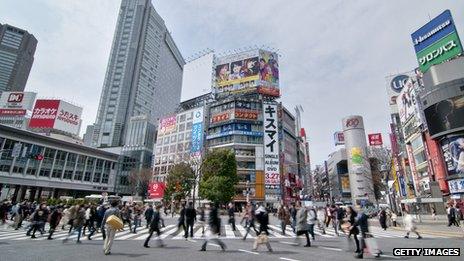Japan's quarterly growth disappoints ahead of sales tax hike
- Published

Japanese spending is expected to slow because of a sale tax increase
Japan's economy grew less than expected at the end of last year, countering forecasts it would see higher spending ahead of a sales tax increase in April.
Gross domestic product rose by 1% on an annualised basis in the three-month period to December, compared with market estimates for a 2.8% expansion.
This was due to weaker private consumption and capital spending, as well as lower export figures.
However, this was Japan's fourth straight quarterly expansion.
The latest figures highlight questions about the sustainability of Japan's economic recovery, and whether the government's policy of 'Abenomics' is working.
"The disappointing GDP result is a reflection of the limit of Abenomics," Takuji Okubo, chief economist at Japan Macro Advisors in Tokyo said.
"Fiscal stimulus and monetary stimulus can only do so much without the actual change in the competitiveness of Japanese economy.
"Only when there is a real change in the competitiveness of the Japanese companies, and a positive change in the long term economic outlook will there be a real change in Japan's growth performance."
Trade deficit
Japanese Prime Minister Shinzo Abe has implemented an aggressive stimulus programme
Since taking office over a year ago, Prime Minister Shinzo Abe has implemented an aggressive stimulus programme aimed at weakening the value of the Japanese currency.
The hope was that a weaker currency would spur purchases of Japanese products such as cars, since they become cheaper to buy abroad.
The Japanese yen lost about 18% of its value against the US dollar last year as a result of his policies, but the boost to exports has been limited.
That is because Japan has also seen a surge in imports, mostly of fuel, to supply the country with power after its nuclear plants were mothballed following the 2011 Fukushima crisis.
This has caused the world's third-largest economy to log an increasingly large and persistent trade deficit.
Sales tax rise
Japan is also struggling to rein in one of the developed world's biggest public debts, which economists have warned could hurt the country's fiscal health in the long term.
To address this, Mr Abe pushed through legislation last year that will see the consumption tax rise to 8% from 5%.
However, Japan's GDP is forecast to shrink in the April-to-June period because of the increase in sales tax, since consumers are expected to put off purchases as a result of the higher price tags.
"I am not so concerned about domestic demand given a buying rush ahead of a sales tax hike in April will play out more strongly in the current quarter," said Taro Saito, senior economist at NLI Research Institute.
Mr Okubo, meanwhile, forecasts Japan will fall into a recession in 2015.
"Private consumption is likely to tank following the tax rate hike. Both working household as well as pensioners will suffer negative income growth," he said.
"Fiscal stimulus may keep Japan from falling into outright recession in 2014, but the sustained fiscal stimulus through public work will defeat the purpose of raising consumption tax."
Japan's stock market had a mixed reaction to the data, with the benchmark Nikkei 225 index rising about 0.4% in choppy trading.
- Published27 January 2014
- Published22 January 2014
- Published9 January 2014
- Published6 January 2014